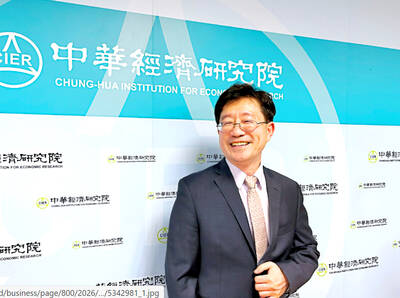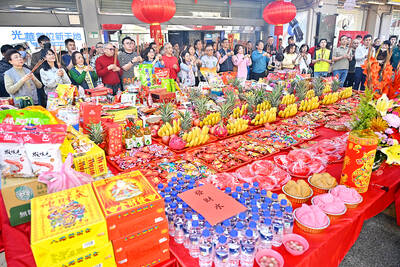In a major concession designed to protect Taiwanese farmers, agricultural products from China will not be included in a planned cross-strait economic cooperation framework agreement’s (ECFA) “early harvest list,” a Council of Agriculture official (COA) said.
Hsiao Tung-chung (蕭柊瓊), deputy director-general of the COA’s International Cooperation Division, said that during the second round of ECFA negotiations, which concluded on April 1, the Chinese side agreed not to demand further opening of the Taiwanese market for Chinese agricultural produce or to include such products on the “early harvest” list — goods and services that will enjoy lower or no tariffs if an ECFA is signed.
Taiwan maintains a ban on the importation of more than 800 agricultural products from China that were in effect when President Ma Ying-jeou (馬英九) took office on May 20, 2008, and will not reduce tariffs on the 1,415 agricultural items already allowed, Hsiao said.
She was responding to remarks by former national policy adviser Ellen Huang (黃越綏) that Taiwan’s agriculture and fishery sectors could be seriously undermined if an ECFA were signed.
Hsiao said that at the first round of ECFA talks held in Beijing on Jan. 26, Taiwan refused to discuss further opening to Chinese agricultural products.
Costs are the main reason behind the government’s decision to allow imports of some types of agricultural products, she said.
For example, Taiwan began allowing the importation of watermelon seeds from China in 1989 because local farmers didn’t show interest in the product due to high production costs, Hsiao said.
Statistics from 2007 show that 7.97 hectares were devoted to watermelons, a figure that fell to 1.06 hectares in 2008.
There was almost no production last year, she said.
However, Taiwan has maintained bans the import of Chinese watermelons.
The opening to imports of Chinese Pu-erh tea leaves and garlic was also based on the fact that they are not produced locally, or as a result of high transport costs of imports from other countries, Hsiao said.

The Grand Hotel Taipei on Saturday confirmed that its information system had been illegally accessed and expressed its deepest apologies for the concern it has caused its customers, adding that the issue is being investigated by the Ministry of Justice Investigation Bureau. The hotel said that on Tuesday last week, it had discovered an external illegal intrusion into its information system. An initial digital forensic investigation confirmed that parts of the system had been accessed, it said, adding that the possibility that some customer data were stolen and leaked could not be ruled out. The actual scope and content of the affected data

DO THEY BITE IT? Cats have better memories than people might think, but their motivation is based entirely around the chance of getting fed Cats can remember the identity of the people who fed them the day before, Taipei-based veterinarians said on Friday, debunking a popular myth that cats have a short memory. If a stray does not recognize the person who fed them the previous day, it is likely because they are not carrying food and the cat has no reason to recognize them, said Wu Chou Animal Hospital head Chen Chen-huan (陳震寰). “When cats come to a human bearing food, it is coming for the food, not the person,” he said. “The food is the key.” Since the cat’s attention is on the food, it

Taiwan must act to preempt potential Section 301 investigations as US President Donald Trump moves to a new tariff strategy, following a US Supreme Court ruling that voided tariff measures, an academic said yesterday. Countries running the largest trade surpluses with the US face a growing likelihood of Section 301 investigations, Chung-Hua Institution for Economic Research president Lien Hsien-ming (連賢明) said. Section 301 refers to a provision of the Trade Act of 1974 that allows Washington to impose retaliatory tariffs over perceived unfair trade practices, including the running of large trade surpluses. Because Taiwan has become the fourth-largest source of the US’ trade

People hold incense and pray with offerings in front of Taipei’s Kuanghwa Market yesterday. The fifth day of the Lunar New Year is traditionally about welcoming the God of Wealth, during which companies and shops set off firecrackers to celebrate their reopening and pray for good business in the new year.